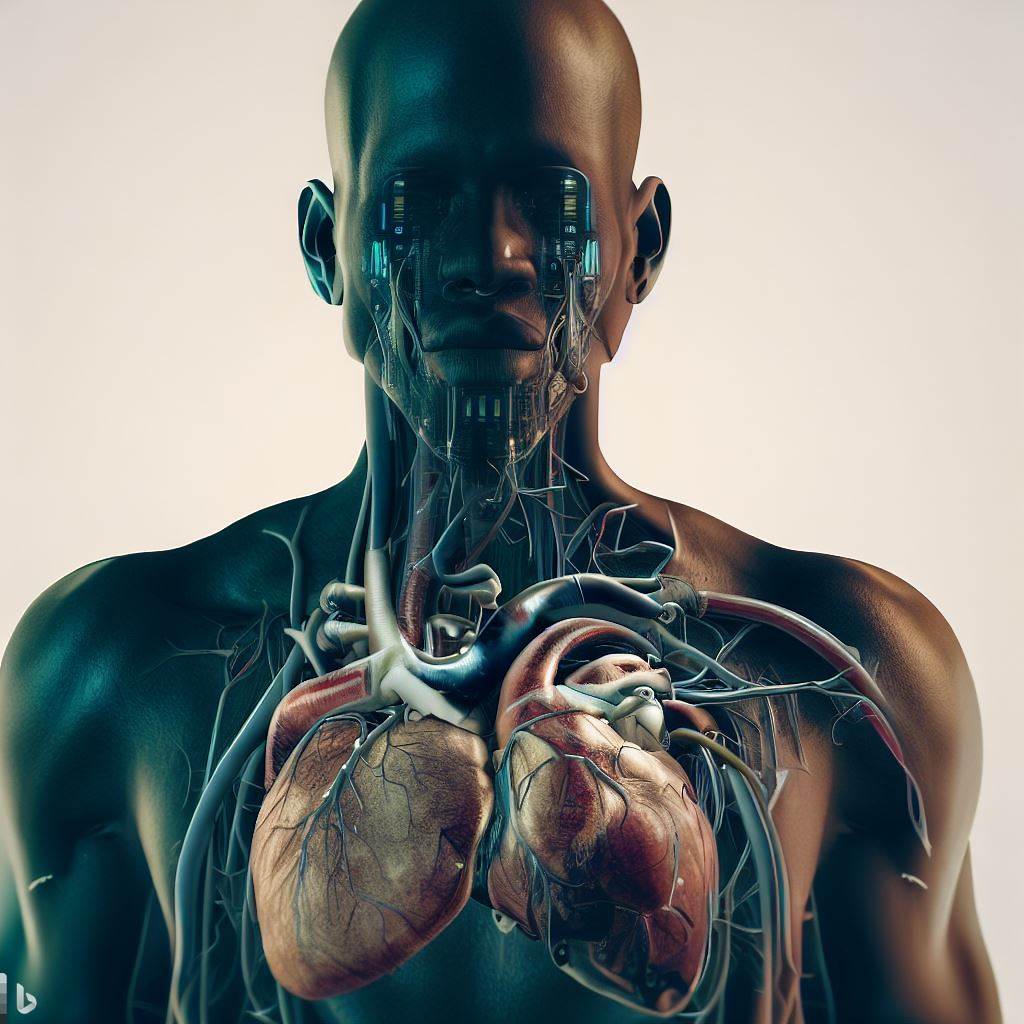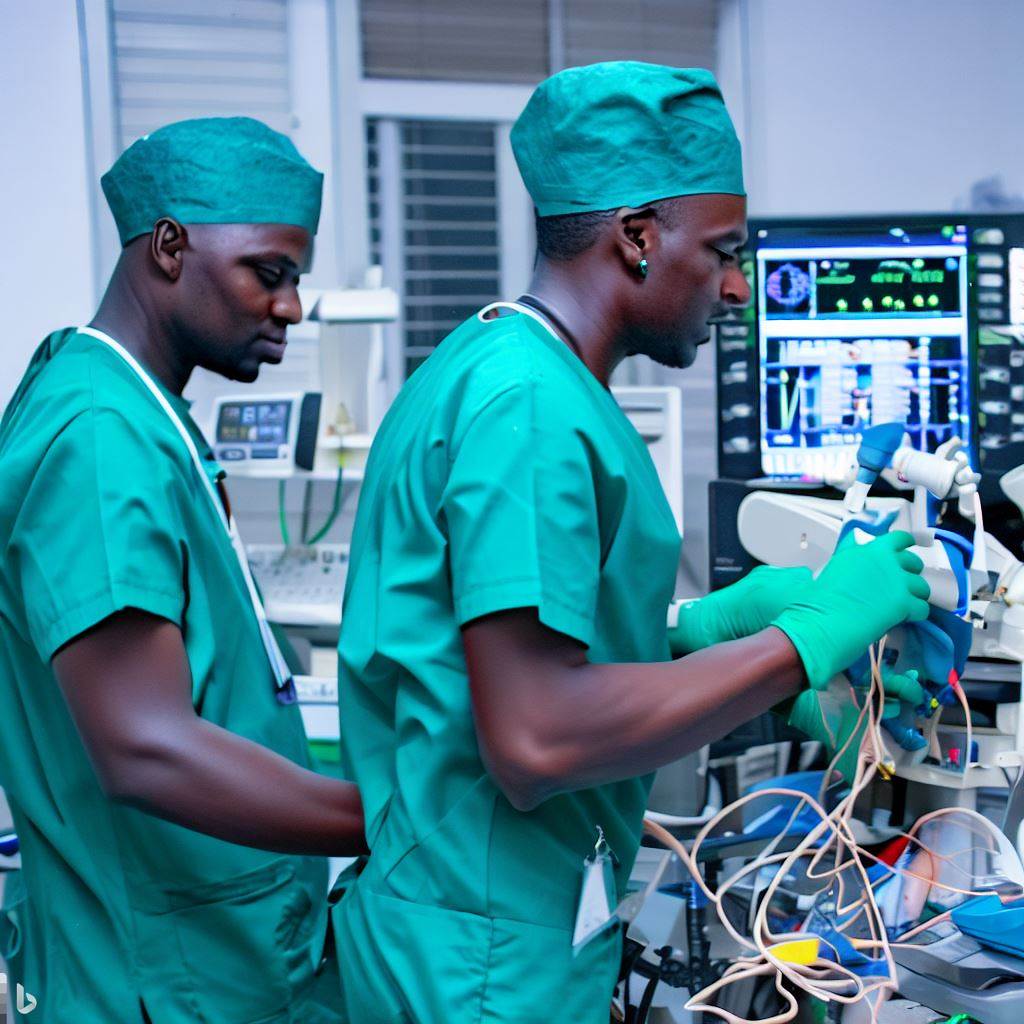Introduction
Cardiovascular technologists play a vital role in diagnosing and treating heart diseases. In Nigeria, the demand for these professionals is on the rise due to various factors.
This blog explores the rapidly growing profession of cardiovascular technology in Nigeria and the opportunities it offers for healthcare professionals.
The growing demand for cardiovascular technologists in Nigeria is fueled by several factors. Firstly, the prevalence of heart diseases in the country is increasing, making it necessary to have qualified professionals who can accurately diagnose and treat these conditions.
Secondly, advancements in medical technology have led to the development of various non-invasive procedures that require the expertise of cardiovascular technologists.
As the demand for cardiovascular technologists grows, so does the need for highly skilled professionals in this field. This presents numerous opportunities for healthcare professionals looking to specialize in cardiovascular technology.
It offers a chance to work in cutting-edge medical facilities, contribute to innovative research, and make a significant impact in improving heart health in Nigeria.
In essence, cardiovascular technology is a rapidly growing profession in Nigeria, driven by the increasing demand for skilled professionals to diagnose and treat heart diseases.
This field provides healthcare professionals with a wide range of opportunities, making it an appealing choice for those looking to specialize in cardiovascular health.
Overview of Cardiovascular Technologists
Definition and Role
Cardiovascular technologists are medical professionals who assist in diagnosing and treating heart conditions. They work under the supervision of physicians and use specialized equipment and techniques.
Their role includes conducting tests, analyzing results, and providing valuable information to support patient care.
Significance of Cardiovascular Technology
Cardiovascular technology plays a crucial role in the accurate diagnosis of heart diseases. Through various imaging techniques, technologists help identify and monitor abnormalities in the heart and blood vessels.
This enables timely intervention and effective treatment, ultimately enhancing patient outcomes.
Specialized Skills and Knowledge
Cardiovascular technologists require a strong foundation in anatomy, physiology, and cardiovascular principles.They must possess excellent communication skills to interact with patients and healthcare professionals.
Proficiency in operating and maintaining complex medical equipment is essential for accurate test results.
Technologists should stay updated with advancements in cardiovascular technology for continuous improvement in their practice.
Diagnostic Procedures by Cardiovascular Technologists
- Echocardiography: Technologists use ultrasound to capture detailed images of the heart’s structure and function.
- Electrocardiography: They perform ECGs to record the electrical activity of the heart and detect abnormalities.
- Vascular Testing: Technologists assess blood flow and identify blockages or abnormalities in blood vessels using various techniques.
- Cardiac Stress Testing: They conduct stress tests to evaluate the heart’s response to physical activity.
- Invasive Procedures: Some technologists assist during cardiac catheterization and angioplasty procedures.
Work Environment and Career Advancement
Cardiovascular technologists primarily work in hospitals, clinics, and cardiac diagnostic laboratories with an aging population and increasing heart disease cases, the demand for these professionals is on the rise. Advancement opportunities include specialization in a specific area of cardiovascular technology or pursuing a supervisory role. Continuous education and professional development programs further enhance career prospects in this field.
The Future of Cardiovascular Technologists in Nigeria
In Nigeria, the demand for skilled cardiovascular technologists is expected to increase steadily.
The government and private healthcare sectors are recognizing the critical role of these professionals in improving cardiac care. There is a need for educational institutions to offer comprehensive cardiovascular technology programs.
Efforts to attract and retain qualified technologists should be complemented by providing competitive salaries and a conducive work environment.
Cardiovascular technologists play a vital role in diagnosing and treating heart conditions. Their specialized skills, knowledge, and use of advanced technology contribute to accurate diagnoses and improved patient outcomes.
With the growing importance of cardiovascular health, the demand for these professionals is expected to rise in Nigeria. To meet this demand, it is crucial to develop comprehensive educational programs and create favorable working conditions to attract and retain qualified cardiovascular technologists.
Read: The Intersection of Technology and Law in Nigeria
Current State of Cardiovascular Technology in Nigeria
When it comes to the existing healthcare infrastructure in Nigeria, there are several key points to consider.
The limited number of cardiovascular technologists in the country is a cause for concern. These professionals face numerous challenges in their field.
Existing Healthcare Infrastructure in Nigeria:
The healthcare infrastructure in Nigeria is characterized by a mix of public and private healthcare facilities.
Public healthcare facilities often face challenges such as inadequate funding, inadequate staffing, and outdated medical equipment. The private healthcare sector tends to provide better quality services, but it is only accessible to those who can afford it.
There is a clear disparity between healthcare services available in urban areas compared to rural areas. The overall healthcare system is still in need of significant improvement to meet the needs of the population.
Limited Number of Cardiovascular Technologists in Nigeria
Despite the growing need for cardiovascular healthcare services, there is a scarcity of trained cardiovascular technologists in Nigeria.
This shortage of professionals has a direct impact on the quality and availability of cardiovascular care in the country. The lack of skilled technicians limits the capacity to accurately diagnose and treat cardiovascular diseases.
This shortage also means that patients have to wait longer for diagnostic tests and procedures. The limited number of cardiovascular technologists also hampers efforts to conduct research and gather data on cardiovascular health in Nigeria.
Challenges Faced by Cardiovascular Technologists in Nigeria
- Limited training opportunities: There are not enough training programs or institutions in Nigeria that offer specialized courses in cardiovascular technology.
- Inadequate equipment and resources: Many healthcare facilities lack the necessary equipment and resources to perform cardiovascular tests and procedures effectively.
- Heavy workload: Due to the limited number of cardiovascular technologists, those working in the field often have to handle a heavy workload, leading to potential burnout and decreased quality of care.
In general, the current state of cardiovascular technology in Nigeria presents several challenges. The existing healthcare infrastructure in the country needs significant improvement to meet the population’s needs. The scarcity of trained cardiovascular technologists further exacerbates the situation.
These professionals face challenges such as limited training opportunities, inadequate resources, and funding issues. Addressing these challenges is crucial to improving cardiovascular healthcare in Nigeria and meeting the growing demand for these services.
Read: Legal Careers Outside Courtroom: Opportunities in Nigeria

Factors Driving the Demand for Cardiovascular Technologists in Nigeria
Cardiovascular diseases have become increasingly prevalent in Nigeria, driving the demand for cardiovascular technologists in the country. This chapter will discuss the factors that contribute to the growing need for professionals in this field.
Increasing Prevalence of Cardiovascular Diseases
The first and most important factor driving the demand for cardiovascular technologists is the alarming increase in the prevalence of cardiovascular diseases in Nigeria. According to recent studies, cardiovascular diseases such as heart attacks and strokes are now responsible for a significant number of deaths in the country.
This rise in cardiovascular diseases can be attributed to various lifestyle factors such as poor diet, lack of exercise, and smoking. The changing lifestyle patterns and adoption of Western dietary habits have contributed to an increase in obesity, hypertension, and diabetes, all of which are risk factors for cardiovascular diseases.
As the number of patients with cardiovascular diseases increases, there is a growing need for cardiovascular technologists who specialize in diagnostic procedures and treatment interventions.
Growing Awareness and Emphasis on Preventive Healthcare
There has been a significant shift in recent years towards preventive healthcare in Nigeria. The population is becoming more aware of the importance of early detection and intervention to prevent the onset of cardiovascular diseases.
With increased awareness, individuals are seeking regular check-ups and screenings to identify potential cardiovascular risk factors at an early stage. This increased emphasis on prevention has led to a higher demand for cardiovascular technologists who can conduct diagnostic tests and assist in preventive healthcare initiatives.
Advancements in Medical Technology and Diagnostics
The advancements in medical technology and diagnostics have revolutionized the field of cardiovascular healthcare in Nigeria. New imaging techniques, such as echocardiography and cardiac catheterization, allow for accurate diagnosis and monitoring of cardiovascular diseases.
Furthermore, the development of minimally invasive procedures and robotic-assisted surgeries has improved patient outcomes and reduced recovery time. These advancements in medical technology have increased the complexity of cardiovascular procedures, requiring specialized professionals like cardiovascular technologists.
Cardiovascular technologists play a vital role in operating and maintaining the sophisticated medical equipment used in these procedures. They are trained to interpret test results, perform diagnostic tests, and assist in complex surgical interventions.
The demand for cardiovascular technologists in Nigeria is driven by several factors, including the increasing prevalence of cardiovascular diseases, the growing emphasis on preventive healthcare, and advancements in medical technology and diagnostics.
As Nigeria continues to face the challenge of cardiovascular diseases, the role of cardiovascular technologists in the healthcare system becomes even more crucial. These professionals will play a significant role in early detection, treatment, and prevention of cardiovascular diseases, ultimately improving the overall cardiovascular health of the population.
Read: Influence of Customary Law in the Nigerian Legal System
Opportunities for Cardiovascular Technologists in Nigeria
In recent years, the field of cardiovascular technology has seen significant growth and development in Nigeria. This growth can be attributed to the expanding job market and the increasing demand for skilled professionals in this field.
Let’s explore some of the opportunities available for cardiovascular technologists in Nigeria.
Expanding Job Market and Demand for Skilled Professionals
The healthcare industry in Nigeria is rapidly expanding, creating a higher demand for cardiovascular technologists. Hospitals, clinics, and diagnostic centers are seeking qualified professionals to meet the growing needs of patients.
The rise in cardiovascular diseases in the country has further increased the demand for skilled technologists. With advances in technology and increased awareness, more patients are seeking early diagnosis and treatment. This has led to an increased reliance on cardiovascular technologists to perform essential tests and procedures.
Potential Career Paths and Specialization Options
Cardiovascular technologists in Nigeria have various career paths and specialization options. They can specialize in areas such as echocardiography, vascular technology, cardiac catheterization, and electrocardiography.
Specializing in a specific area allows technologists to become experts in their field and opens up more job opportunities. They can work in hospitals, research centers, pharmaceutical companies, or even start their own private practice.
As the field continues to evolve, new specializations are likely to emerge, providing further avenues for growth and development.
Competitive Salary Prospects and Job Stability
Cardiovascular technologists in Nigeria enjoy competitive salary prospects and job stability.
Due to the specialized nature of their work, technologists are in high demand and can negotiate better compensation packages. As the healthcare system improves and more focus is placed on preventive care, the demand for skilled technologists will continue to rise.
The job stability in this profession is also high, as cardiovascular diseases are on the rise and will require constant monitoring and treatment. Technologists can expect long-term job security and opportunities for career advancement.
Ultimately, the field of cardiovascular technology in Nigeria holds immense opportunities for those looking to pursue a career in this field. The expanding job market and demand for skilled professionals, along with the potential career paths and specialization options, make it an attractive choice.
Additionally, the competitive salary prospects and job stability ensure a rewarding and fulfilling professional journey. As Nigeria’s healthcare system continues to develop, the need for cardiovascular technologists will only increase, providing a promising future in this growing profession.
Read: Environmental Laws in Nigeria: Protecting Nature’s Rights
Education and Training Options for Aspiring Cardiovascular Technologists in Nigeria
When it comes to pursuing a career as a cardiovascular technologist in Nigeria, there are several educational programs and institutions that offer specialized training.
In this section, we will discuss the available options and the necessary qualifications for aspiring professionals in this field.
Educational Programs and Institutions
- University of Lagos: Offers a Bachelor’s degree in Cardiovascular Science with a specialization in cardiovascular technology.
- Lagos State University Teaching Hospital: Provides a Diploma program in Cardiac Care Technology.
- National Postgraduate Medical College of Nigeria: Offers a Fellowship program in Cardiology for medical graduates.
These institutions provide comprehensive training programs that equip students with the necessary knowledge and skills to excel in the field of cardiovascular technology.
Curriculum and Qualifications
The curriculum of these programs typically covers various aspects of cardiovascular technology, including anatomy, physiology, echocardiography, electrocardiography, and invasive procedures.
Students also gain hands-on experience through clinical rotations in hospitals.
To be eligible for these programs, aspiring cardiovascular technologists must meet certain qualifications, such as:
- A minimum of five credits in subjects like Mathematics, English, Biology, Chemistry, and Physics in their secondary school education.
- A strong foundation in science and a genuine interest in the cardiovascular field.
- Passing the university entrance examination or fulfilling the admission criteria set by the institution.
Students with a background in medicine, nursing, or related healthcare professions are often preferred due to their prior knowledge and experience in the medical field.
Importance of Professional Certifications and Continuing Education
Obtaining professional certifications is highly advantageous for cardiovascular technologists in Nigeria. These certifications validate their expertise and enhance their professional credibility One of the most recognized certifications in this field is the Registered Cardiovascular Invasive Specialist (RCIS) offered by the Cardiovascular Credentialing International (CCI).
Continuing education is also vital for cardiovascular technologists to stay updated with the latest advancements in technology, procedures, and research. They can attend conferences, workshops, and seminars to expand their knowledge and improve their skills.
Moreover, continuing education helps cardiovascular technologists fulfill the requirements for certification renewal, ensuring their competence and commitment to providing quality patient care. Choosing the right educational program and institution is crucial for individuals aspiring to become cardiovascular technologists in Nigeria.
The curriculum and qualifications set the foundation for a successful career, while professional certifications and continuing education contribute to their professional growth and development.
By pursuing the necessary education and training, cardiovascular technologists can make significant contributions to the healthcare system in Nigeria and play a vital role in diagnosing and treating cardiovascular diseases.
Overcoming Challenges and Improving the Cardiovascular Technology Sector in Nigeria
Over the years, the cardiovascular technology sector in Nigeria has faced numerous challenges.
However, with the right investments, partnerships, and training programs, these challenges can be overcome, leading to significant improvements in the sector.
Investment in Healthcare Infrastructure and Equipment
One of the key challenges in the cardiovascular technology sector in Nigeria is the lack of adequate healthcare infrastructure and equipment. To improve the sector, there is a need for significant investment in upgrading existing healthcare facilities and acquiring state-of-the-art cardiovascular technology equipment.
With the necessary infrastructure and equipment, healthcare providers can offer better diagnosis and treatment for cardiovascular diseases. This will lead to improved patient outcomes and a reduction in the burden of cardiovascular diseases in Nigeria.
The Importance of Public-Private Partnerships
Public-private partnerships play a crucial role in bridging the gap in the cardiovascular technology sector in Nigeria. By partnering with private entities, the government can leverage their resources and expertise to improve the sector.
Private entities can contribute by investing in healthcare infrastructure and equipment, supporting research and development of new technologies, and providing training and capacity building programs for cardiovascular technologists.
These partnerships can help accelerate advancements in the sector and enhance the delivery of cardiovascular healthcare services in Nigeria.
Find Out More: Nigeria’s Social Work Framework: An Analysis
Increasing the Number of Cardiovascular Technologists
Another challenge in the sector is the shortage of skilled cardiovascular technologists. To address this issue, it is essential to increase the number of professionals in this field through scholarships and training programs.
By offering scholarships to aspiring cardiovascular technologists, more individuals will have the opportunity to pursue a career in this field. Additionally, training programs can be established to provide specialized education and practical skills required for cardiovascular technology.
This will not only address the shortage but also ensure that healthcare facilities have a skilled workforce to operate and maintain cardiovascular technology equipment.
Furthermore, collaboration with international organizations and institutions can facilitate knowledge exchange and capacity building in the field of cardiovascular technology. Nigerian healthcare professionals can benefit from training programs conducted by renowned cardiovascular institutions around the world.
To summarize, overcoming the challenges in the cardiovascular technology sector in Nigeria requires strategic investments, public-private partnerships, and initiatives to increase the number of skilled cardiovascular technologists.
By improving healthcare infrastructure, leveraging partnerships, and providing scholarships and training programs, Nigeria can enhance its cardiovascular technology sector and ensure better cardiovascular healthcare for its population.
Read: Challenges and Solutions in Nigeria’s Social Work Practice
Conclusion
The demand for cardiovascular technologists in Nigeria is on the rise. This profession plays a crucial role in enhancing cardiac healthcare in the country.
As we have explored throughout this blog chapter, cardiovascular technologists are trained professionals who specialize in diagnosing and treating heart and blood vessel conditions. With the increasing prevalence of cardiovascular diseases in Nigeria, there is an urgent need for skilled individuals in this field.
Publish Your Professional Profile, Business or Brand
Showcase your expertise, gain trust, and boost visibility instantly on Professions.ng.
Publish NowBy utilizing advanced medical technology, cardiovascular technologists contribute significantly to the improvement of cardiac healthcare outcomes. They work closely with cardiologists and other healthcare professionals to perform diagnostic tests, assist in surgical procedures, and monitor patients’ heart conditions.
If you are aspiring to have a fulfilling career in the healthcare industry, cardiovascular technology is a profession worth considering. By choosing this path, you can make a significant impact on the lives of individuals with cardiovascular diseases and contribute to saving lives in Nigeria.
On a final note, the growing demand for cardiovascular technologists in Nigeria highlights the importance of this profession in the nation’s healthcare system.
I encourage all aspiring healthcare professionals to explore the opportunities in cardiovascular technology and consider a career in this rewarding field.




